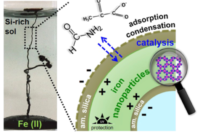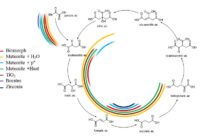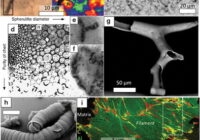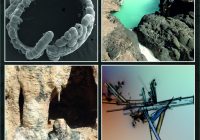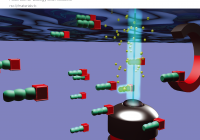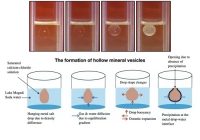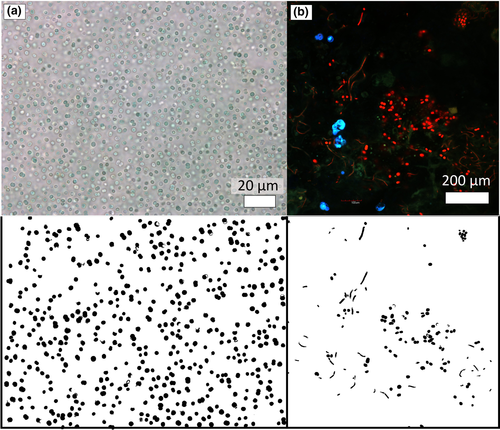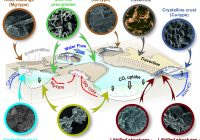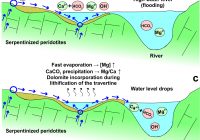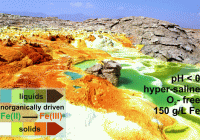Iron-silica self-organized membranes, so-called chemical gardens, behave as fuel cells and catalyze the formation of amino/carboxylic acids and RNA nucleobases from organics that were available on early Earth. Despite their relevance for prebiotic chemistry, little is known about their structure and mineralogy at the nanoscale. Studied here are focused ion beam milled sections of iron-silica membranes, grown from synthetic and natural, alkaline, serpentinization-derived fluids thought to be widespread on early Earth. Electron microscopy shows they…
Read MoreOutcomes
Prebiotic Organic Chemistry of Formamide and the Origin of Life in Planetary Conditions: What We Know and What Is the Future
The goal of prebiotic chemistry is the depiction of molecular evolution events preceding the emergence of life on Earth or elsewhere in the cosmos. Plausible experimental models require geochemical scenarios and robust chemistry. Today we know that the chemical and physical conditions for life to flourish on Earth were at work much earlier than thought, i.e., earlier than 4.4 billion years ago. In recent years, a geochemical model for the first five hundred million years…
Read MoreAn Alternative Approach for Assessing Biogenicity
Rouillard, J.; van Zuilen, M.; Pisapia, C.; Garcia-Ruiz, J. M., An Alternative Approach for Assessing Biogenicity. Astrobiology 2020. Download here: https://www.liebertpub.com/doi/full/10.1089/ast.2020.2282https://www.liebertpub.com/doi/full/10.1089/ast.2020.2282 The search for signs of life in the ancient rock record, extreme terrestrial environments, and other planetary bodies requires a well-established, universal, and unambiguous test of biogenicity. This is notably true for cellular remnants of microbial life, since their relatively simple morphologies resemble various abiogenic microstructures that occur in nature. Although lists of qualitative…
Read MorePhD Student Manolis Giampouras defended his thesis
In continental settings, the interaction between meteoric water and ultramafic rocks generates waters of variable physicochemical characteristics due to serpentinization and weathering. The discharge of these waters forms aerial alkaline to hyperalkaline spring systems where waters mix, undergo evaporation, and take up atmospheric CO2, leading to the precipitation of carbonate minerals. The understanding of natural carbonation in these serpentinite-hosted alkaline environments is critical, among others, for assessing the role of this process in the global…
Read MoreLight-switchable anchors on magnetized biomorphic microcarriers
Opel, J.; Rosenbaum, L.-C.; Brunner, J.; Staiger, A.; Zimmermanns, R.; Kellermeier, M.; Gaich, T.; Cölfen, H.; García-Ruiz, J.-M., Light-switchable anchors on magnetized biomorphic microcarriers. Journal of Materials Chemistry B 2020. Download here: https://pubs.rsc.org/-/content/articlelanding/2020/tb/c9tb02955a#!divAbstract Microcarriers with the ability to release and catch substances are highly desired metamaterials and difficult to obtain. Herein, we report a straightforward strategy to synthesize these materials by combining silica-biomorphs with mesocrystals. An easy access to microcarrier hulls with covalently bound spiropyrans…
Read MoreMineral Vesicles and Chemical Gardens From Carbonate-Rich Alkaline Brines of Lake Magadi, Kenya
Melese Getenet, Juan Manuel García-Ruiz, Cristóbal Verdugo-Escamilla and Isabel Guerra-TGetenet, M.; García-Ruiz, J.M.; Verdugo-Escamilla, C.; Guerra-Tschuschke, I. Mineral Vesicles and Chemical Gardens From Carbonate-Rich Alkaline Brines of Lake Magadi, Kenya. Crystals 2020, 10, 467. Download here: https://www.mdpi.com/2073-4352/10/6/467 Mineral vesicles and chemical gardens are self-organized biomimetic structures that form via abiotic mineral precipitation. These membranous structures are known to catalyze prebiotic reactions but the extreme conditions required for their synthesis has cast doubts on their formation…
Read MoreIdentifying microbial life in rocks: Insights from population morphometry
Rouillard, J., García-Ruiz, J. M., Kah, L., Gérard, E., Barrier, L., Nabhan, S., … & van Zuilen, M. A. (2019). Identifying microbial life in rocks: Insights from population morphometry. Geobiology. Download here: https://onlinelibrary.wiley.com/doi/full/10.1111/gbi.12377 The identification of cellular life in the rock record is problematic, since microbial life forms, and particularly bacteria, lack sufficient morphologic complexity to be effectively distinguished from certain abiogenic features in rocks. Examples include organic pore‐fillings, hydrocarbon‐containing fluid inclusions, organic coatings on exfoliated…
Read MoreOn the controls of mineral assemblages and textures in alkaline springs, Samail Ophiolite, Oman
Giampouras, M., Garrido, C. J., Bach, W., Los, C., Fussmann, D., Monien, P., & García-Ruiz, J. M. (2020). On the controls of mineral assemblages and textures in alkaline springs, Samail Ophiolite, Oman. Chemical Geology, 533, 119435. Download here: https://reader.elsevier.com/reader/sd/pii/S0009254119305649?token=FACA37743A2F972AE2B911F77A8DCCDEACF06A0C63789FD0DBD05292BFA1840E2464C5ECD037CC97ADD42D8E8A33CEDC Interactions between meteoric water and ultramafic rocks in the Oman Ophiolite generate waters of variable physicochemical characteristics. The discharge of these waters forms complex alkaline pool networks, in which mineral precipitation is triggered by mixing, evaporation, and uptake…
Read MoreGeochemistry and mineralogy of serpentinization-driven hyperalkaline springs in the Ronda peridotites
Giampouras, M., Garrido, C. J., Zwicker, J., Vadillo, I., Smrzka, D., Bach, W., … & García-Ruiz, J. M. (2019). Geochemistry and mineralogy of serpentinization-driven hyperalkaline springs in the Ronda peridotites. Lithos, 350, 105215. Download here: https://reader.elsevier.com/reader/sd/pii/S0024493719303743?token=F0784FC81F5A036EDA8C552FF36661EC672B7D471A5884AAF2A4DC869AEB9BAD907638B73D29C64A5FA0E30461D5CCD4 We present a detailed study of the water geochemistry, mineralogy and textures in serpentinization-related hyperalkaline springs in the Ronda peridotites. Ronda waters can be classified into hyperalkaline fluids and river waters that are broadly similar to Ca2+–OH– and Mg2+–HCO3– water types described in…
Read MoreA Polyextreme Hydrothermal System Controlled by Iron: The Case of Dallol at the Afar Triangle
Kotopoulou, E., Delgado Huertas, A., Garcia-Ruiz, J. M., Dominguez-Vera, J. M., Lopez-Garcia, J. M., Guerra-Tschuschke, I., & Rull, F. (2018). A Polyextreme hydrothermal system controlled by iron: the case of Dallol at the Afar triangle. ACS Earth and Space Chemistry, 3(1), 90-99. Download here: https://pubs.acs.org/doi/pdf/10.1021/acsearthspacechem.8b00141 One of the latest volcanic features of the Erta Ale range at the Afar Triangle (NE Ethiopia) has created a polyextreme hydrothermal system located at the Danakil depression on top of a…
Read More

